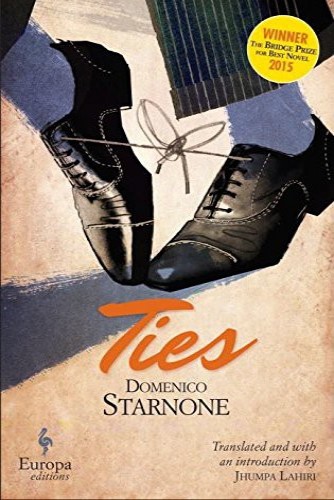
Ties
کتاب های مرتبط
- اطلاعات
- نقد و بررسی
- دیدگاه کاربران
نقد و بررسی

January 16, 2017
“In case it’s slipped your mind, Dear Sir, let me remind you: I am your wife.” Vanda writes this to her husband, Aldo, who hasn’t come home for six days. It’s Naples, 1974, and Aldo and Vanda married young, and now, when intellectuals have decided that “fidelity is a virtue of the petty bourgeoisie,” they’re stuck. Or she is: Aldo has found love and happiness, and stays gone for four years. We learn that in the second section of the book, its longest, narrated by Aldo after the apartment he and Vanda share has been broken into and trashed, their beloved cat disappeared. Although they reunited decades ago, Vanda and Aldo are still furious, and as he sorts through his demolished possessions, Aldo tells his side of the affair. The problem is that he tells and tells, displaying little self-awareness and seemingly expecting sympathy he may not have earned. Anna, Vanda and Aldo’s daughter, middle-aged and scarred, like her feckless brother, by the breakup and the resumed marriage, is no picnic either—angry, manipulative, greedy. Though Starnone’s willingness to let his characters—particularly Aldo—incriminate themselves can be read as writerly confidence, the novel, despite being slim, feels long.

Starred review from January 1, 2017
Four years after leaving his wife and children, Aldo returns to them, ready to rebuild.Starnone's (First Execution, 2009, etc.) latest work begins with a bang: "In case it's slipped your mind, Dear Sir, let me remind you: I am your wife. I know that this once pleased you and that now, suddenly, it chafes." So Vanda writes in a letter to her husband, Aldo, who's left her, and their children, for a younger woman. It's a familiar enough narrative, repeated often enough in Western literature and popular culture to seem cliched, banal even. But it's Starnone's exquisite artistry that sculpts this story into something much finer. The first portion of the slim book is taken up with Vanda's letters to Aldo, letters sent over the course of the years he is away from home. But the second section skips several decades ahead. Vanda and Aldo are together again. They have been away on holiday and, when they return, find their house ransacked: furniture overturned, glass broken, books and boxes of papers of all sorts scattered everywhere, trampled underfoot. It seems that thieves have been by in their absence. The break-in forces a kind of confrontation between Vanda and Aldo and the past they haven't spoken of in years. Starnone's work is subtle and nuanced, and, in Lahiri's elegant translation, his prose is fluid and clear. It is by no means comprehensive. You will not hear from all sides; you will hear hardly anything from Lidia, Aldo's "other woman," for example. The book is a snapshot, a sliver of a marriage. It is as vivid and devastating as anything you will read this year. A slim, stunning meditation on marriage, fidelity, honesty, and truth.
COPYRIGHT(2017) Kirkus Reviews, ALL RIGHTS RESERVED.

Starred review from December 1, 2016
Aside from fine writing and a relentless plot, this portrait of a marriage has lots recommending it. Starnone (First Execution) has claimed Italy's most prestigious literary honor, the Strega Prize; this book won the Bridge Prize, given jointly by the U.S. Embassy in Rome and the Italian Embassy in Washington, DC; and the translator is Pulitzer Prize winner Lahiri. The narrative opens as a cri de coeur from Vanda, abandoned by husband Aldo for a younger woman; leaps several decades to Aldo's reflections on why he left and why he returned four years later; and ends with the couple's adult children venting their spleen. The overly dramatic Vanda claims a need to understand, while the rather spineless Aldo reveals that he could not let go of the exhilaration born of new love, even as he saw he was hurting his family (what a lousy father). And though he cannot relinquish the past, Aldo also can't see himself in the scrawled letters he left from that time. VERDICT A scalding and incisive display of damage done and people missing their mark.
Copyright 2016 Library Journal, LLC Used with permission.

























دیدگاه کاربران